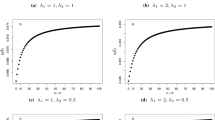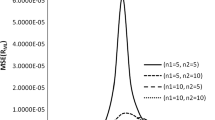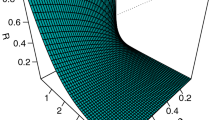Abstract
In reliability literature and engineering applications, stress-strength (SS) models are particularly important. This paper aims to estimate the SS reliability for an inverse Weibull distribution having the same shape parameters but different scale parameters when the strength (X) and stress (Y) random variables are independent. In the presence of outliers and in a homogeneous situation, the maximum likelihood reliability estimator is computed. With independent gamma priors, a Bayesian estimation approach for SS reliability is also proposed. The symmetric and asymmetric loss functions are used to derive the Bayesian estimators of SS reliability. Some sophisticated calculations are carried out using Markov chain Monte Carlo methods. Simulations are used to investigate the precision of Bayesian and non-Bayesian estimates for SS reliability. Further, a comparative study among the Bayesian estimates in the case of uniform and gamma priors is carried out utilizing a simulation methodology. The provided methodology is ultimately applied to the actual data using the discussed model and data from head-neck cancer. According to the results of a study, larger sample sizes resulted in better reliability estimates for both techniques. Generally, as the number of outliers increased, the precision measures from both methods decreased. In all circumstances, the Bayesian estimates under the precautionary loss function outperformed the observed estimates under alternative loss functions. The actual data analysis assured the theoretical and simulated studies.













Similar content being viewed by others
References
Kwak SK, Kim JH (2017) Statistical data preparation: management of missing values and outliers. Korean J Anesthesiol 70(4):407–411. https://doi.org/10.4097/kjae.2017.70.4.407
Shi Y (2022) Advances in big data analytics: theory, algorithm and practice. Springer, Singapore
Shi Y, Tian YJ, Kou G, Peng Y, Li JP (2011) Optimization based data mining: theory and applications. Springer, Berlin
Tien JM (2017) Internet of things, real-time decision making, and artificial intelligence. Ann Data Sci 4(2):149–178
Olson DL, Shi Y (2007) Introduction to business data mining. McGraw-Hill/Irwin, New York
Kotz S, Lumelskii Y, Pensky M (2003) The stress-strength model and its generalizations: theory and applications. World Scientific, New York
Nasiri P, Pazira H (2010) Estimation of P (Y< X) for exponential distribution in the presence of k outliers. J Appl Sci 5:2176–2189
Ghanizadeh A (2011) Estimation of P(Y<X) in the Rayleigh distribution in the presence of k outliers. J Appl Sci 11:3192–3197. https://doi.org/10.3923/jas.2011.3192.3197
Hassan AS, Elsayed AE, Shalaby RS (2013) On the estimation of P(Y<X<Z) for Weibull distribution in the presence of k outliers. Int J Eng Res Appl 3:1728–1734
Nasiri P (2016) Estimation parameter of R= P (Y< X) for Lomax distribution with presence of outliers. Int Math Forum 11:239–248. https://doi.org/10.12988/imf.2016.512106
Karimi H, Nasiri P (2018) Estimation parameter of R= P (Y< X) for length-biased weighted Lomax distributions in the presence of outliers. Math Comput Appl 23(1):9. https://doi.org/10.3390/mca23010009
Mahmoudi SM, Zarei R (2022) Some reliability estimates for generalized exponential distribution with presence of k-Outliers. Revstat Stat J 20:1–14. https://doi.org/10.57805/revstat.v20i1.358
Keller AZ, Kamath ARR, Perera UD (1982) Reliability analysis of CNC machine tools. Reliab Eng 3(6):449–473. https://doi.org/10.1016/0143-8174(82)90036-1
Calabria R, Pulcini G (1990) On the maximum likelihood and least-squares estimation in the inverse Weibull distribution. Stat Appl 2:53–66
Calabria R, Pulcini G (1994) Bayes 2-sample prediction for the inverse Weibull distribution. Commun Stat Theory Methods 23:1811–1824. https://doi.org/10.1080/03610929408831356
Sultan KS (2008) Bayesian estimates based on record values from the inverse Weibull lifetime model. Qual Technol Quant Manag 5:363–374. https://doi.org/10.1155/2021/6648462
Kundu D, Howlader H (2010) Bayesian inference and prediction of the inverse Weibull distribution for type-II censored data. Comput Stat Data Anal 54(6):1547–1558. https://doi.org/10.1016/j.csda.2010.01.003
Hassan AS, Al-Thobety AK (2012) Optimal design of failure step stress partially accelerated life tests with type I censored inverted Weibull data. Int J Eng Res Appl 2:3242–3253
Hassan AS, Assar SM, Zaky AN (2015) Constant-stress partially accelerated life tests for inverted Weibull distribution with multiple censored data. Int J Adv Stat Probab 3:72–82. https://doi.org/10.14419/ijasp.v3i1.4418
Bi Q, Gui W (2017) Bayesian and classical estimation of stress-strength reliability for inverse Weibull lifetime models. Algorithms 10(2):71. https://doi.org/10.3390/a10020071
Hassan AS, Elsherpieny EA, Mohamed RE (2018) Odds generalized exponential-inverse Weibull distribution: properties and estimation. Pak J Stat Oper Res 14(1):1–22. https://doi.org/10.18187/pjsor.v14i1.2086
Yadav AS, Singh SK, Singh U (2018) Estimation of stress–strength reliability for inverse Weibull distribution under progressive type-II censoring scheme. J Ind Prod Eng 35(1):48–55. https://doi.org/10.1080/21681015.2017.1421590
Hassan AS, Zaky AN (2019) Estimation of entropy for inverse Weibull distribution under multiple censored data. J Taibah Univ Sci 13:331–337. https://doi.org/10.1080/16583655.2019.1576493
Maurya RK, Tripathi YM, Kayal T (2022) Reliability estimation in a multicomponent stress-strength model based on inverse Weibull distribution. Sankhya B 84:364–401. https://doi.org/10.1007/s13571-021-00263-0
Basheer AM, Okasha HM, El-Baz AH, Tarabia AMK (2023) E-Bayesian and hierarchical Bayesian estimations for the inverse Weibull distribution. Ann Data Sci 10:737–759. https://doi.org/10.1080/00949655.2023.2285347
Dixit UJ (1989) Estimation of parameters of the gamma distribution in the presence of outliers. Commun Stat Theory Methods 18:3071–3085
Dixit UJ, Nasiri P (2001) Estimation of parameters of the exponential distribution in the presence of outliers generated from uniform distribution. Metron 59:187–198
Lynch SM (2007) Introduction to applied Bayesian statistics and estimation for social scientists. Springer, New York
Efron B (1988) Logistic regression, survival analysis, and the Kaplan–Meier curve. J Am Stat Assoc 83:414–425. https://doi.org/10.1080/01621459.1988.10478612
Kundu D, Gupta RD (2006) Estimation of P [Y< X] for Weibull distributions. IEEE Trans Reliab 55:270–280. https://doi.org/10.1109/TR.2006.874918
Author information
Authors and Affiliations
Corresponding author
Ethics declarations
Conflict of interest
No potential conflict of interest was reported by the authors.
Additional information
Publisher's Note
Springer Nature remains neutral with regard to jurisdictional claims in published maps and institutional affiliations.
Rights and permissions
Springer Nature or its licensor (e.g. a society or other partner) holds exclusive rights to this article under a publishing agreement with the author(s) or other rightsholder(s); author self-archiving of the accepted manuscript version of this article is solely governed by the terms of such publishing agreement and applicable law.
About this article
Cite this article
Hassan, A.S., Elsherpieny, E.A. & Mohamed, R.E. Bayesian Estimation of Stress Strength Modeling Using MCMC Method Based on Outliers. Ann. Data. Sci. (2024). https://doi.org/10.1007/s40745-023-00512-1
Received:
Revised:
Accepted:
Published:
DOI: https://doi.org/10.1007/s40745-023-00512-1




